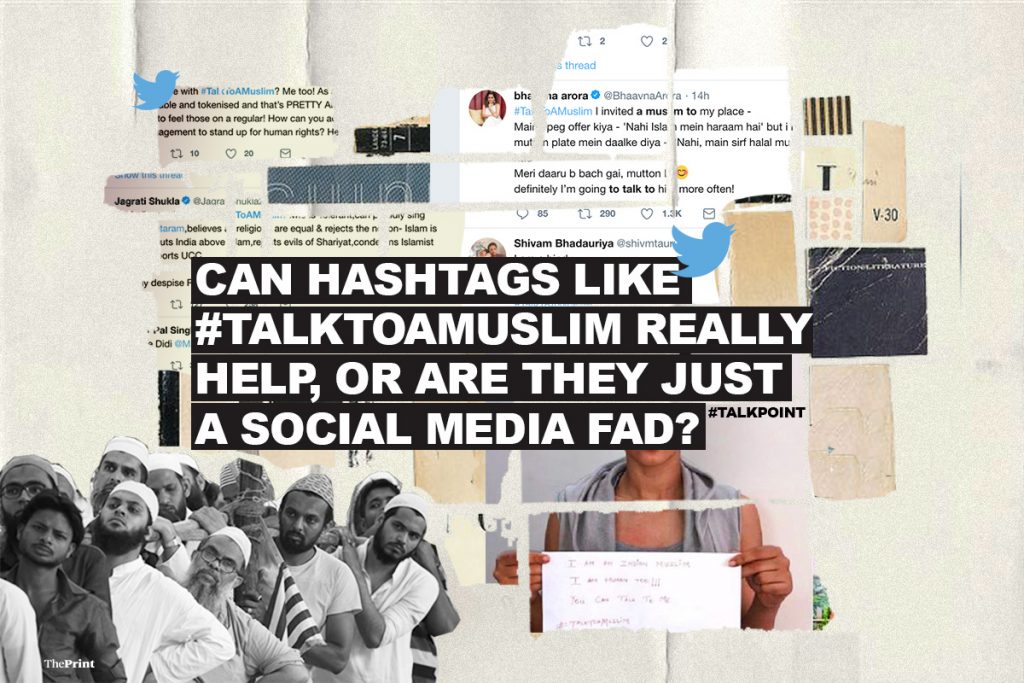#TalkToAMuslim: armchair activism gone horribly wrong

By: Masarat Daud
In a parallel world, today is 100th birth anniversary of Nelson Mandela, a peace activist radical by today’s standards. I say parallel because in India’s cauldron, the toxic anti-minority (particularly anti-Muslim) sentiments continued stewing.
This time, the battleground was Twitter and this will go down in social media workshops as a well-intentioned social activism attempt gone wrong. The hashtag started as a way to ‘humanise’ Muslims with people writing about their interests as a way of conversation starters for non-Muslims or others holding placards announcing their openness in inter-religious discussions.
This concept has erupted onto many sides; the most simplistic viewpoint says that this a bridge-building exercise, encouraging non-Muslims to have a conversation with Muslims. Simple viewpoints are often the most dangerous because nuances are real and navigating them is a challenge. There are three reasons why a simplistic stand is a dangerous one: audience, context and approach.
The fundamental usage of the word ‘Muslim’ is flawed. For anyone claiming to speak on behalf of Muslims is complicating a global narrative. Muslim activists globally struggle to bring this point to light; Muslim communities are diverse, culturally and religiously, and to paint groups of people as a monolith is a disservice to people writing and fighting to change the way the various Muslim communities are perceived. Black Muslims have their own sets of challenges, as do South Asian Muslims living in UK or US, and Indian Muslims have their own sets of challenges, which cannot be understood by Muslim communities outside the context.
Secondly, who are these Twitter users who need to humanise Muslims? Clearly, as a Twitter user, we can assume that a certain level of education (language and computers) is required, making it a privileged platform of engagement. By taking the burden of engagement upon us, it turns us into the problem without an inkling of ownership on the ones who other us. One Twitter user mentioned that this is an important hashtag because “it is difficult to have conversations” with Muslims, because even if it happens, one cannot “sustain” it. Instead of searching for reasons of disengagement (lack of shared experiences perhaps?), is blaming a religion the solution?
The next viewpoint says that the audience for this hashtag is not a Qasim, Akhlaq or a Junaid. Is this hashtag humanising the elite liberals in their echo chambers? But another contradictory voice says that this hashtag is needed because poor Muslims are being lynched. This brings me to my main question: who comes to Twitter to change their mind? The response to most of the well-intentioned tweets have been hateful bile. It is a round-robin of the usual suspects making themselves available as the Muslims to be talked to by another gang of usual suspects who pat on their backs and validate their stand.
The group that feels this hashtag is condescending and who refuse to propagate it, have a valid standpoint too. When I first saw the hashtag, it angered me. I thought it was a desperate attempt at mollycoddling ourselves as the peaceful, engaging Muslims. As one Twitter user lamented that “most Hindus have no Muslim friends” – let us have an honest conversation about sharing this burden. Whose hateful cross are we carrying on our backs?
Another Twitter user joked that they were being referred to on TV as the “placard gang” without any mention of the cause or the sentiment behind the hashtag. This, precisely, is the problem. All that remains are newly-evolved ways to stigmatise Muslims and make them accept responsibility for a hatred that someone else needs to start addressing.
This conditional liberalism will bring more challenges to the Muslims in India. We must see beyond our privileges to understand that simplistic societal computing isn’t always so simple.
